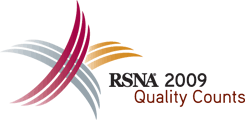
Abstract Archives of the RSNA, 2009
SSG04-01
Reduction in Lung Cancer Mortality as a Result of CT Screening
Scientific Papers
Presented on December 1, 2009
Presented as part of SSG04: Chest (Malignancy)
Claudia I. Henschke MD, PhD, Presenter: Research grant, AstraZeneca PLC
Research grant, Carestream Health, Inc
Advisory Board, Carestream Health, Inc
Institutional license agreement, General Electric Company
Royalty payments from Cornell Research Foundation for a licensing agreement with General Electric (divested in April 2009)
Paolo Boffetta MD, MPH, Abstract Co-Author: Nothing to Disclose
Rowena Yip MPH, Abstract Co-Author: Nothing to Disclose
David F. Yankelevitz MD, Abstract Co-Author: Research grant, OSI Pharmaceuticals, Inc
Research grant, Carestream Health, Inc
Research grant, GlaxoSmithKline plc
Research grant, AstraZeneca PLC
Medical Advisor, PneumRx, Inc
Shareholder, PneumRx, Inc
Patent, System method and apparatus for small pulmonary nodule computer aided diagnosis from computed tomography scans
Patent, System and method for three-dimensional image rendering and analysis
Patent application, System and method for analyzing medical data to determine diagnosis and treatment
Patent application, System, Method and Apparatus for Small Pulmonary Nodule Computer Aided Diagnosis from Computed Tomography Scans
Patent application, System and Method for Position Matching of a Patient for Medical Imaging
Patent application, System and method for three-dimensional image rendering and analysis
Patent application, Medical Imaging Visibility Index System and Method For Cancer Lesions
Patent application, Medical Imaging System For Accurate Measurement Evaluation Of Changes In A Target Lesion
Patent application, Method for expanding the domain of imaging software in a diagnostic work-up
Patent application, Steerable device for accessing a target site and methods
Patent application, System and method for providing remote analysis of medical data
Patent application, System and method for conducting a clinical trial study
James Smith MD, Abstract Co-Author: Nothing to Disclose
Daniel M. Libby, Abstract Co-Author: Nothing to Disclose
Mark Pasmantier MD, Abstract Co-Author: Nothing to Disclose
00030490-DMT et al, Abstract Co-Author: Nothing to Disclose
CT screening has been shown to increase lung cancer curability as estimated by long-term Kaplan-Meier survival rates. We now seek to assess the reduction in lung cancer mortality.
We compared the lung-cancer mortality in a cohort of 7,994 smokers not exposed to asbestos (age 50-85, average 66 years) who had baseline CT screening for lung cancer in New York State (NYS) with an unscreened cohort of 307,992 sokers (age 50-85, average 58 years) enrolled in the American Cancer Society Cancer Prevention Study II (CPS-II). Average pack-years of smoking was 48 and 34 for the NYS cohort and CPS-II cohort, respectively. Lung-cancer deaths for both cohorts were obtained using the National Death Index. We determined the standardized mortality ratio (SMR) of observed to expected lung cancer deaths after jointly adjusting by age, sex, and smoking history.
In the NYS cohort, 62 participants died of lung cancer. Of these, 47 occurred in patients with screen- and interim-diagnosed lung cancer, 10 of the 47 were patients who had clinical Stage I disease when first identified but treatment was delayed until the cancer had progressed to higher stages. The remaining 15 deaths occurred in participants whose last screening CT had been interpreted as negative for lung cancer, also confirmed by retrospective review, had no known diagnosis of lung cancer and had dropped out of the screening program for 19 months or more, and died 19-93 months (median 51 months) after their last negative CT scan. Using the lung-cancer death rates obtained form the CPS-II cohort, the expected deaths in the NYS cohort was 83.0 and observed deaths were 47, so that the SMR = 47/83.0 = 0.57 (95% CI: 0.42, 0.75, P = 5 x 10^-6), consistent with a 43% mortality reduction. The SMR remained significant when the deaths of participants who dropped out of screening were included, 62/83.0 = 0.75 (P = 0.003), consistent with a 25% mortality reduction.
CT screening significantly reduces lung-cancer mortality.
Annual CT screening saves lives.
Henschke, C,
Boffetta, P,
Yip, R,
Yankelevitz, D,
Smith, J,
Libby, D,
Pasmantier, M,
et al, 0,
Reduction in Lung Cancer Mortality as a Result of CT Screening. Radiological Society of North America 2009 Scientific Assembly and Annual Meeting, November 29 - December 4, 2009 ,Chicago IL.
http://archive.rsna.org/2009/8017106.html

